短暂性动词,延续性动词和现在完成时
现在完成时中短暂性动词与延续性动词的转换

Two years has passed since his brother joined the army .
相关练习
8B unit2 课课练 grammar部分有相关练习 可自行完成,核对答案
非延续性动词要转换成延续性动词,方法主要有 以下三种:
1.row 2. buy 3. put on
keep have wear
.
2. 转化成be+形容词或介词
1. go there 2. come here
be there be here
.
3. come back
4. die 5. leave 6. open 7. close 8. go/get out
be back
be dead be away (from) be open be closed be out
9. finish/end be over
10. become
be
.
11. get up
be up
.
We haven’t seen him since 1992.
She hasn’t left home all her life.
.
在以下句型中,短暂性动词要转换成延续性动词:
现在完成时态的肯定句中,有for或since引导的,或其他种类的表 示一段时间的时间状语
例如:He has died for 20 years. 这句话就是错误的。 die是一个瞬间动词,需要转化为延续性动词。 句子改为 He has been dead for 20 years.
borrow, get up 等.
现在完成时中短暂性动词与延续性动词的转换

在以下句型中,短暂性动词要转换成延续性动词:
1.完成时态的肯定句 2. 句中, 有for或since引导的, 或其他种类的表示一段时间的时间状语
例如: He has died for 20 years. 这句话就是错误的。 die是一个瞬间动词,需要转化为延续性动词。 句子改为 He has been dead for 20 years.
现在完成时中 短暂性动词与延续性动词的转化
也称做终止性动词、非延续性动词或瞬 间动词。
表示动作不能延续, 只是一瞬间就结束 的动作。
come, go, arrive, reach, see, hear, close, open, leave, begin, start, lose, buy, fall, join, die, become, borrow, get up 等.
1.实义动词转化成实义动词
2.转化成be+形容词或介词
3.转化成be+名词(词组)
His grandfather
His grandfather His grandfather
His grandfather
It’s five years since his grandfather died. Five years has passed since his grandfather died.
His brother has been in the army .
It’s two years since his brother joined the army .
Two years has passed since his brother joined the army .
相关练习
8B unit2 课课练 grammar部分有相关练习 可自行完成, 核对答案
短暂性动词与延续性动词的用法

短暂性动词与延续性动词在现在完成时中的用法英语中的动词有多种分类法。
根据其有无含义,动词可分为实义动词和助动词;根据动词所表示的是动作还是状态,可以分为行为动词和状态动词;根据动词所表示的动作能否延缓,分为延续性动词和终止性动词。
英语中,按动词延续的时间长短,可将动词分为延续性动词和短暂性动词。
延续性动词如learn, study, work, play, wait,have,,live,teach,keep,like 等。
短暂性动词是非延续性动词,即动作一开始便结束的动词,又可称结束性动词,瞬间动词,如leave, begin, start, return, arrive, reach, die, marry, bear, see, hear, receive, buy, get, enter, take off, start off, come in, come back, take place, break out, put on, put down, go in 等。
终止性动词构成的现在完成时,不可以用表示一段时间的状语(如:since 和for引导的短语)来修饰,终止性动词构成的现在完成时,只表示动作发生的因果关系,不能表示动作的延续,因此不能用表示一段时间的状语来修饰。
如可以说:The Red Cross has already started for the earthquake-stricken area.但不可说:The Red Cross has already started for the earthquake-stricken area for three days.因为start是终止性动词, 它所表示的动作短促, 当红十字会出发时,start这个动作便结束了, 不可能延续两天。
1. 用ago时间状语短语来代替since或for引导的时间状语:eg. Mr. Richard has returned from America for two years. (wrong) Mr. Richard has returned from America since two years ago. (wrong) 应改为: He returned from America two years ago.2.用It is… since…复合句代替简单句eg. It has been/is two years since Mr. Richard returned from America.注意:以上两种办法适用于所有终止性动词。
现在完成时延续性动词与非延续(瞬间性)动词

• It began to rain at eight yesterday morning .(正)又如:
• -When did you get to know Jack?
• -Two years ago.
•Then you've known each other for more th an two years.
• 一、延续性动词可以与表示时间段的状语连用。 表示时间段的短语有:
• for+一段时间,如:for 2 years,for a long time; since从句, 如:since he came here;
• since+时间点名词, 如:since last year, since 5 days ago; how long等。
• 2.延续性动词不能与表示短暂时间的"点时 间"状语连用。如: It raind at eight yesterday morning.(误 ) rain为延续性动词,而at eight表示"点时间 ",前后显然矛盾。如果用延续性动词表示 一瞬间的动作,可以借助come, begin, get 等终止性动词来表示。上句可改为
• 如:for 3 years,since he came here,how long,ect.且看下面三个错误句子:
• 1)Jim has come here for five years.
• 2)He has died for 3 years.
• 否定的终止性动词可以与表示时间段的时间状 语连用。
eg. I bought the book 5 days ago. I have had the book for 5 days.
常用短暂性动词与延续性动词及其例句
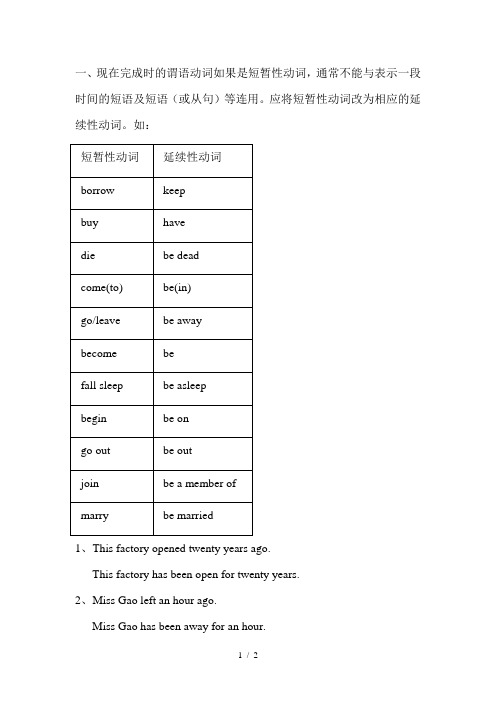
一、现在完成时的谓语动词如果是短暂性动词,通常不能与表示一段时间的短语及短语(或从句)等连用。
应将短暂性动词改为相应的延续性动词。
如:1、This factory opened twenty years ago.This factory has been open for twenty years.2、Miss Gao left an hour ago.Miss Gao has been away for an hour.3、Her teacher has been a Party member for 3 years.Her teacher joined the Party 3 years ago.4、The film began two minutes ago.The film has been on since two minutes ago.5、He bought the bike two years ago.He has had the bike for two years.6、The old man died ten years ago.The old man has been dead for ten years.7、He came back 3 days ago.He has been back for 3 days.8、I left my hometown 10 years ago.I have been away from my hometown for 10 years.9、They got married 13 year ago.They have been married for 13 years.10、I borrowed the book a week ago.I have kept the book for a week.How long have you kept the book?注:在否定句中,短暂性动词可以和表示一段时间的状语连用。
(完整)现在完成时延续性与暂短性动词用法
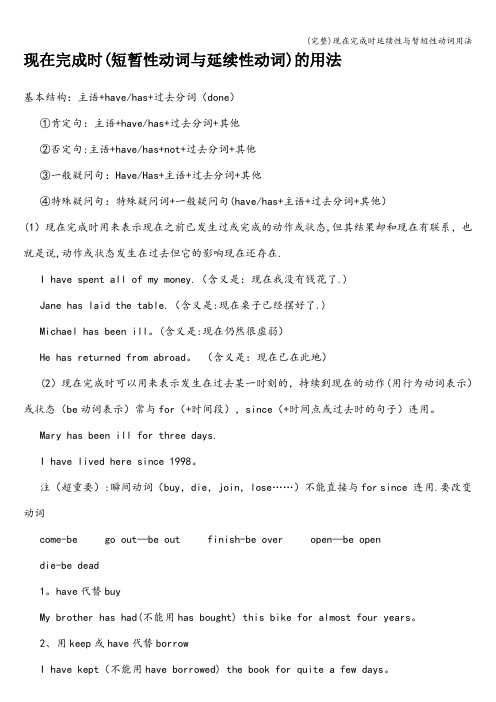
现在完成时(短暂性动词与延续性动词)的用法基本结构:主语+have/has+过去分词(done)①肯定句:主语+have/has+过去分词+其他②否定句:主语+have/has+not+过去分词+其他③一般疑问句:Have/Has+主语+过去分词+其他④特殊疑问句:特殊疑问词+一般疑问句(have/has+主语+过去分词+其他)(1)现在完成时用来表示现在之前已发生过或完成的动作或状态,但其结果却和现在有联系,也就是说,动作或状态发生在过去但它的影响现在还存在.I have spent all of my money.(含义是:现在我没有钱花了.)Jane has laid the table.(含义是:现在桌子已经摆好了.)Michael has been ill。
(含义是:现在仍然很虚弱)He has returned from abroad。
(含义是:现在已在此地)(2)现在完成时可以用来表示发生在过去某一时刻的,持续到现在的动作(用行为动词表示)或状态(be动词表示)常与for(+时间段),since(+时间点或过去时的句子)连用。
Mary has been ill for three days.I have lived here since 1998。
注(超重要):瞬间动词(buy,die,join,lose……)不能直接与for since 连用.要改变动词come-be go out—be out finish-be over open—be opendie-be dead1。
have代替buyMy brother has had(不能用has bought) this bike for almost four years。
2、用keep或have代替borrowI have kept(不能用have borrowed) the book for quite a few days。
现在完成时中短暂性动词变延续性动词归纳表
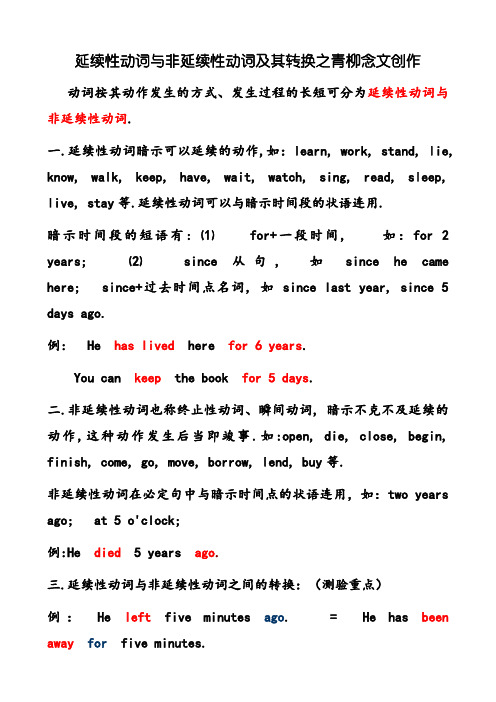
延续性动词与非延续性动词及其转换之青柳念文创作动词按其动作发生的方式、发生过程的长短可分为延续性动词与非延续性动词.一.延续性动词暗示可以延续的动作,如:learn, work, stand, lie, know, walk, keep, have, wait, watch, sing, read, sleep, live, stay等.延续性动词可以与暗示时间段的状语连用.暗示时间段的短语有: ⑴for+一段时间, 如:for 2 years; ⑵since从句, 如since he came here; since+过去时间点名词, 如 since last year, since 5 days ago.例: He has lived here for 6 years.You can keep the book for 5 days.二.非延续性动词也称终止性动词、瞬间动词, 暗示不克不及延续的动作,这种动作发生后当即竣事.如:open, die, close, begin, finish, come, go, move, borrow, lend, buy等.非延续性动词在必定句中与暗示时间点的状语连用,如:two years ago; at 5 o'clock;例:He died 5 years ago.三.延续性动词与非延续性动词之间的转换:(测验重点)例:He left five minutes ago. = He has been away for five minutes.这句话的意思是指他分开的动作是5分钟之前发生的,是过去时.也就是说从他分开到现在已经有五分钟了,这个动作是延续的,要用现在完成时,而且要把原来的短暂性动词改为延续性动词.一些短暂性动词及相应的延续性动词:arrive(get to /reach)→be here (in)begin(start)→be ondie →be deadcomehere(back)→be here(back)leave →be away (from)fall ill(sick, asleep)→be ill(sick, asleep)get up→be upgo/ get out(there)→be out(there)finish →be overput o n →wear 或be onopen →be open(keep sth. open)join →be in或be a member of…+组织机构close →be closedgo to school→be a studentborrow →keepbuy/get →havecatch(a cold)→ have(a cold)get to know →knowbegin to study→studycome to work→work move to → live in finish→ be over come to → be insit down → be seated marry → be married dress → be dressed become → be。
延续性动词和短暂性动词和现在完成时题目

He joined the Party 2 years ago.He has bee n in the Party for 2 years. I bought the book 5 days ago.子中的谓语动词一般为延续性动词。
但是,有些动词所表示的动作是短暂的,这类动词 叫做非延续性动词。
如: come, go, reach, arrive, leave, borrow, buy, jo in, die, begi n, start, finish 等。
在现在完成时的句子中,非延续性动词作谓语动词时,不能和表示一段时间的 状语连用。
表示动作的连续性,就要把非延续性动词转换成相应的延续性动词或短语,具 体转换如下:(要求记住)come/go/reach/arrivein/be leave 宀 beaway from, borrow keep, buy have, jo inbein/be a member of, die bedead, start/begin rbe finish/endbeer, openbe open (adj.), close be closed (adj.), marry Ice m eatci6/(go back to / returnto beback to go out be outbecome be get upbe dpi be dead fall asleep /get tot sleep be asleepienot have put on wear catch / get a coldhave acold ; get to know knovhave / has gone tohave been in注意:1. 非延续性动词可以在现在完成时的否定句中作谓语,并可以与 for , since 引导的时间状语连用,表示动作的延续过程。
例如:She hasn ' t bought anyew clothes since last year.2. 在现在完成时的肯定句中,非延续性动词作谓语时不能与 for , si nee 引导的表示一段时间的状语连用,但可以用其他句式来表示同一个意思。
现在完成时中短暂性动词变延续性动词归纳表
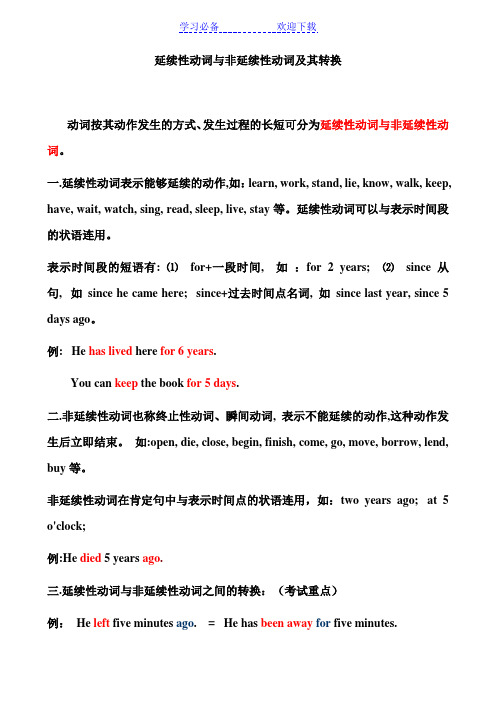
延续性动词与非延续性动词及其转换动词按其动作发生的方式、发生过程的长短可分为延续性动词与非延续性动词。
一.延续性动词表示能够延续的动作,如:learn, work, stand, lie, know, walk, keep, have, wait, watch, sing, read, sleep, live, stay等。
延续性动词可以与表示时间段的状语连用。
表示时间段的短语有: ⑴for+一段时间, 如:for 2 years; ⑵since从句, 如since he came here; since+过去时间点名词, 如since last year, since 5 days ago。
例: He has lived here for 6 years.You can keep the book for 5 days.二.非延续性动词也称终止性动词、瞬间动词, 表示不能延续的动作,这种动作发生后立即结束。
如:open, die, close, begin, finish, come, go, move, borrow, lend, buy等。
非延续性动词在肯定句中与表示时间点的状语连用,如:two years ago; at 5 o'clock;例:He died 5 years ago.三.延续性动词与非延续性动词之间的转换:(考试重点)例:He left five minutes ago. = He has been away for five minutes.这句话的意思是指他离开的动作是5分钟之前发生的,是过去时。
也就是说从他离开到现在已经有五分钟了,这个动作是延续的,要用现在完成时,并且要把原来的短暂性动词改为延续性动词。
一些短暂性动词及相应的延续性动词:arrive(get to /reach)→ be here (in)begin(start) → be ondie → be deadcome here(back)→be here(back)leave → be away (from)fall ill(sick, asleep)→be ill(sick, asleep)get up→ be upgo/ get out(there)→ be out(there)finish → be overput on → wear 或be onopen → be open(keep sth. open)join → be in或be a member of…+组织机构close → be closedgo to school → be a studentborrow →keepbuy/get →havecatch(a cold) → have(a cold)get to know → know begin to study → study come to work → work move to → live in finish → be over come to → be insit down → be seated marry → be married dress → be dressed become → be。
短暂性动词与延续性动词的转化
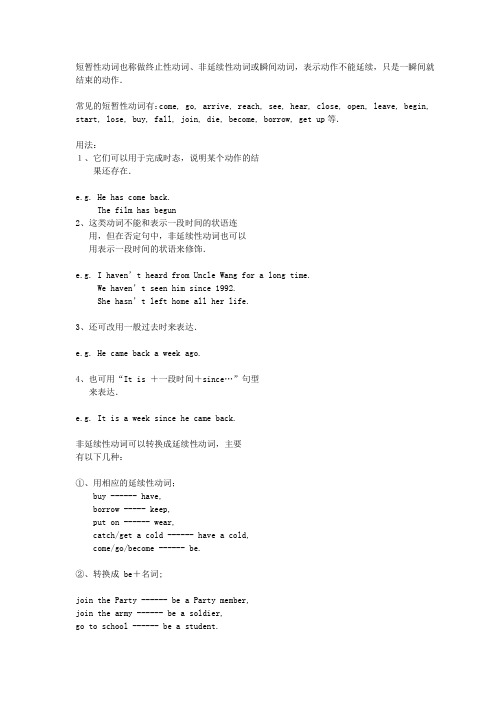
短暂性动词也称做终止性动词、非延续性动词或瞬间动词,表示动作不能延续,只是一瞬间就结束的动作.常见的短暂性动词有:come, go, arrive, reach, see, hear, close, open, leave, begin, start, lose, buy, fall, join, die, become, borrow, get up等.用法:1、它们可以用于完成时态,说明某个动作的结果还存在.e.g. He has come back.The film has begun2、这类动词不能和表示一段时间的状语连用,但在否定句中,非延续性动词也可以用表示一段时间的状语来修饰.e.g. I haven’t heard from Uncle Wang for a long time.We haven’t seen him since 1992.She hasn’t left home all her life.3、还可改用一般过去时来表达.e.g. He came back a week ago.4、也可用“It is +一段时间+since…”句型来表达.e.g. It is a week since he came back.非延续性动词可以转换成延续性动词,主要有以下几种:①、用相应的延续性动词;buy ------ have,borrow ----- keep,put on ------ wear,catch/get a cold ------ have a cold,come/go/become ------ be.②、转换成 be+名词;join the Party ------ be a Party member,join the army ------ be a soldier,go to school ------ be a student.③、转换成be + 介词短语 :go to school ------ be in school,join the army ------ be in the army.④、转换成be + adj./adv. :die ------ be dead, finish ------ be over,begin/start ------ be on, leave (…) ------ be away (from),close ------ be closed, open ------ be open,fall asleep ------ be asleep.巩固练习:(同义转换,每空一词)1.Li Lei joined the Party three years ago.Li Lei ()()()the Party ()three years ago.2009-11-20 04:54回复210.45.224.* 2楼Li Lei ()()()the Party()three years.() three years () Li Lei joined the Party.Three years ()()() Li Lei joined the Party.2.My father left Gucheng last week.My father ()()()() Gucheng () last week.My father ()()()() Gucheng () a week.3.The factory opened in 1996.The factory ()()()() ten years.The factory ()()() since 1996.4. His grandfather died five years ago.His grandfather ()()()since ()()() .His grandfather ()()()()five years.()five years ()his grandfather died.Five years ()()()his grandfather died.5. Mr. Wang reached Beijing five days ago.Mr. Wang ()()() Beijing()five days ago.Mr. Wang ()()() Beijing()five days.6. The film began ten minutes ago.The film ()()()for()().The film ()()()since ()()().答案1.has been in,sincehas been in,forIt's,sincehas passed since2.has been away from,sincehas been away from,for3.has been open forhas been open4.has been dead,five years agohas been dead forIt’s,sincehas passed since5.has been in,sincehas been in,for6.has been on,ten minuteshas been on,ten minutes ago7.has had,forhas had,since8.has kept,forhas kept,since9.has been,forhas been in,since10.have been in,forhave been in,since11.has been asleep,half an hourhas been asleep,half an hour ago请所有来过的人顶我下吧,毕竟打这么多也不容易...短暂性动词,延续性动词和现在完成时短暂性动词是指动作一旦发生就立即结束。
短暂动词与延续性动词

短暂(duǎnzàn)动词与延续性动词短暂(duǎnzàn)动词与延续性动词1.现在(xiànzài)完成时的构成:have / has + 动词(dòngcí)的过去分词2.现在(xiànzài)完成时的用法:(1)表示某一动作或状态开始(kāishǐ)于过去并持续到现在现在。
(此种用法适用于延续性动词)I have been in Nanyang for around 5 years.我在南阳(nán yánɡ)大约有五年了。
(2)表示过去发生或已经完成的某一动作对现在造成的影响或结果(此种用法适用非延续性动词)。
I can’t go to see the movie now, because I have lost the ticket.现在我看不成电影了,因为我把票弄丢了。
3.现在完成时的标志:just, already, yet, ever, never,recently 近来 = in recent weeks (months, years)在最近的几周(月,年)里,nowadays, for + 一段时间,before (用于句子末尾); so far = up to now = till now; since + 过去某一具体时间点,since + 过去的一段时间 + ago, since + 一般过去时从句,ever since then = ever since = since then = since (自从那时起);in / over /during + the + past(last) + 一段时间。
Eg.On January 11,1998, Dr. Kataria organized the first “World Laughter Day” celebration in Mumbai, India. It was a huge success.The date was later changed to the first Sunday in May and it has been celebrated every year since.4.现在完成时中的特殊用法:短暂动词(dòngcí)的各种时态(包括现在完成时在内)不能和时间段连用(liányòng),当它需要与时间段连用时需转换为延续性动词。
现在完成时中短暂性动词与延续性动词的转换

be dead
be away (from)
be open
be closed
be out
11
9. finish/end be over
10. become
be
整理课件
11. get up
be up
12. begin/start(上演) be on
13. fall asleep be asleep
14. fall ill
His brother borrowed the book two weeks ago.
18
整理课件
His brother borrowed the book two weeks ago.
His brother has kept the book for two weeks .
His brother has kept the book since two weeks ago.
be ill
15. move here/there be here/there
16. get to…
be at/in
12
整理课件
17. arrive at / in… be at / in
18. reach…
be at / in
19. get married
be married
13
整理课件
3. 转化成be+名词(词组)
8
整理课件
在以下句型中,短暂性动词要转换成延续性动词:
1. 完成时态的肯定句 2. 句中,有for或since引导的,或其他种类的表示一段时间的时间状语
例如:He has died for 20 years. 这句话就是错误的。 die是一个瞬间动词,需要转化为延续性动词。 句子改为 He has been dead for 20 years.
现在完成时--短暂性动词变延续性动词
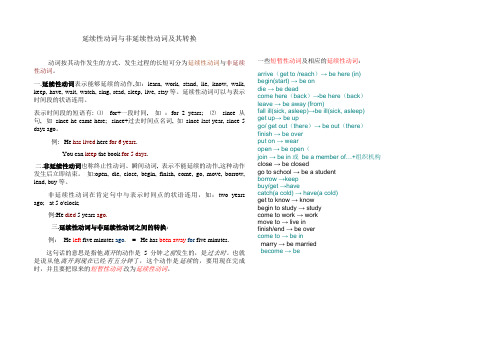
延续性动词与非延续性动词及其转换动词按其动作发生的方式、发生过程的长短可分为延续性动词与非延续性动词。
一.延续性动词表示能够延续的动作,如:learn, work, stand, lie, know, walk, keep, have, wait, watch, sing, read, sleep, live, stay等。
延续性动词可以与表示时间段的状语连用。
表示时间段的短语有: ⑴for+一段时间, 如:for 2 years; ⑵since从句, 如since he came here; since+过去时间点名词, 如since last year, since 5 days ago。
例: He has lived here for 6 years.You can keep the book for 5 days.二.非延续性动词也称终止性动词、瞬间动词, 表示不能延续的动作,这种动作发生后立即结束。
如:open, die, close, begin, finish, come, go, move, borrow, lend, buy等。
非延续性动词在肯定句中与表示时间点的状语连用,如:two years ago; at 5 o'clock;例:He died 5 years ago.三.延续性动词与非延续性动词之间的转换:例:He left five minutes ago. = He has been away for five minutes.这句话的意思是指他离开的动作是5分钟之前发生的,是过去时。
也就是说从他离开到现在已经有五分钟了,这个动作是延续的,要用现在完成时,并且要把原来的短暂性动词改为延续性动词。
一些短暂性动词及相应的延续性动词:arrive(get to /reach)→ be here (in) begin(start) → be ondie → be deadcome here(back)→be here(back)leave → be away (from)fall ill(sick, asleep)→be ill(sick, asleep)get up→ be upgo/ get out(there)→ be out(there)finish → be overput on → wearopen → be open(join → be in或be a member of…+组织机构close → be closedgo to school → be a studentborrow →keepbuy/get →havecatch(a cold) → have(a cold)get to know → knowbegin to study → studycome to work → workmove to → live infinish/end → be overcome to → be inmarry → be marriedbecome → be。
(完整版)现在完成时之短暂性动词与延续性动词用法

短暂性动词,延续性动词zai现在完成时中的应用短暂性动词,延续性动词和现在完成时短暂性动词是指动作一旦发生就立即结束.它不能和一段时间连用.这类动词有:go,come,arrive,leave,begin,start,join,marry等;短暂性动词的肯定式不能与表示一段时间的for或since或how long等状语连用.例如:His father got ill.I have received his letter.但是,不可以说:His father got ill for a week.I have received his letter for three days.在否定句中,短暂性动词可以和表示一段时间的状语连用.例如:We haven’t heard from Jane for a long time.I suppose something must have happened to her.延续性动词是指动作发生后还可以延续一段时间或者相当长的一段时间.如:live,work,study,learn,sleep等,延续性动词可以和表示一段的时间状语连用.值得注意的是,表示一段时间的状语除了“for+一段时间”外,还有since+n./从句(时间点),since+时间段+ago,疑问词how long,in the past+时间段,all these+时间段,from…to(时间点)以及till/until+n./句子等等.例如:How long _______ your brother joined the army?A.hasB.hadC.is it sinceD.was there that通过审题,答案B和D很容易被排除,但是稍不注意便会选中答案A;殊不知how long 为一段时间的状语,不能与非延续性动词短语has joined连用,所以这题的正确答案是C.另外,动词的延续性与非延续性还体现在这两种句型中:延续性动词的肯定式+till/ until 短暂性动词的否定式+till/ until请看例句:We waited until he came.I didn’t go to bed until my father came back home last night.如果短暂性动词与表示一段时间的时间状语连用,必须将短暂性动词改为延续性动词.现归纳总结一下由非延续性动词到延续性动词的转换:arrive→be here begin(start)→be on die →be dead come back→be back leave →be away (from) fall ill(sick,asleep)→be ill(sick,asleep) get up→be up go out →be out finish →be over put on →wear 或be on open →be open join →be in或be a member of…close →be closed go to school→be a student borrow →keep buy/get →have catch(a cold)→have(a cold) get to know →know begin to study→study come to work→work move to →live in finish/end →be over come to →be in sit down →be seated marry →be married dress →be dressed等如:He has been a soldier for three years.他参军三年了.His father has been dead for two years.他父亲去世二年了.The film has been on for ten minutes.电影已开始十分钟了.We have studied English for three years.我们(开始)学英语已三年了.How long can I keep this book?这本书我可以借多长时间?除了用上面的转化形式之外,还可以用其他的表达形式:A.It is/ has been+时间+since……(动词用过去式),B.主语+谓语(过去时)+时间+ago.例如:It’s five days since I received his letter.His father died three years ago.看一个句子可以用以下几种说法:他离开上海已经3天了.He left Shanghai three days ago.He has been away from Shanghai for three days.He has been away from Shanghai since three days ago. It is/ has been three days since he left Shanghai. Three days has passed since he left Shanghai.。
短暂性动词与延续性动词的用法

短暂性动词与延续性动词在现在完成时中的用法英语中的动词有多种分类法。
根据其有无含义,动词可分为实义动词和助动词;根据动词所表示的是动作还是状态,可以分为行为动词和状态动词;根据动词所表示的动作能否延缓,分为延续性动词和终止性动词。
英语中,按动词延续的时间长短,可将动词分为延续性动词和短暂性动词。
延续性动词如learn, study, work, play, wait,have,,live,teach,keep,like 等。
短暂性动词是非延续性动词,即动作一开始便结束的动词,又可称结束性动词,瞬间动词,如leave, begin, start, return, arrive, reach, die, marry, bear, see, hear, receive, buy, get, enter, take off, start off, come in, come back, take place, break out, put on, put down, go in 等。
终止性动词构成的现在完成时,不可以用表示一段时间的状语(如:since 和for引导的短语)来修饰,终止性动词构成的现在完成时,只表示动作发生的因果关系,不能表示动作的延续,因此不能用表示一段时间的状语来修饰。
如可以说:The Red Cross has already started for the earthquake-stricken area.但不可说:The Red Cross has already started for the earthquake-stricken area for three days.因为start是终止性动词, 它所表示的动作短促, 当红十字会出发时,start这个动作便结束了, 不可能延续两天。
1. 用ago时间状语短语来代替since或for引导的时间状语:eg. Mr. Richard has returned from America for two years. (wrong) Mr. Richard has returned from America since two years ago. (wrong) 应改为: He returned from America two years ago.2.用It is… since…复合句代替简单句eg. It has been/is two years since Mr. Richard returned from America.注意:以上两种办法适用于所有终止性动词。
- 1、下载文档前请自行甄别文档内容的完整性,平台不提供额外的编辑、内容补充、找答案等附加服务。
- 2、"仅部分预览"的文档,不可在线预览部分如存在完整性等问题,可反馈申请退款(可完整预览的文档不适用该条件!)。
- 3、如文档侵犯您的权益,请联系客服反馈,我们会尽快为您处理(人工客服工作时间:9:00-18:30)。
短暂性动词,延续性动词和现在完成时延续性动词是指动作发生后还可以延续一段时间或者相当长的一段时间。
如:live,work, study, learn, sleep等,延续性动词可以和表示一段的时间状语连用。
短暂性动词是指动作一旦发生就立即结束。
它不能和一段时间连用。
这类动词有:go,come, arrive, leave, begin, start, join, marry等;★在否定句中,短暂性动词可以和表示一段时间的状语连用。
We haven’t heard from Jane for a long time.★短暂性动词的肯定式不能与表示一段时间的for或since或how long等状语连用。
★值得注意的是,表示一段时间的状语除了“for+一段时间”外,还有since+n./从句(时间点),since+时间段+ago,疑问词how long,in the past+时间段,all these+时间段,from…to(时间点)以及till/until+n./句子等等。
例如:.I have received his letter for three days(×) I have received his letter.(√)How long did she leave .(×) How long has she been away (√)★★★如果短暂性动词与表示一段时间的时间状语连用,必须将短暂性动词改为延续性动词。
现归纳总结一下由非延续性动词到延续性动词的转换:arrive→be here finish →be over catch(a cold)→have(a cold)arrive→be here★除了用上面的转化形式之外,还可以用其他的表达形式:A. It is 或者 It has been+时间+since……(动词用过去式),B.主语+谓语(过去时)+时间+ago。
例如:It’s five days since I received his letter.His father died three years ago.看一个句子可以用以下几种说法:他离开上海已经3天了。
He left Shanghai three days ago.He has been away from Shanghai for three days/since three days ago It is/has been three days since he left Shanghai.Three days has passed since he left Shanghai.几点注意事项:(1)have been(to)与have gone( to)的区别:have been(to)表示“去过某地(现在已经回来了)”,可用于各人称;have gone(to)表示“去某地了(说话时某人不在当地)”,可能在去的路上,可能已在某地,也可能在回来的路上,总之,人不在这里。
常用第三人称作主语。
前者可与once,never, several times等连用,后者则不能。
如:They have been to Beijing twice.他们去过北京两次。
He has gone to Beijing他去北京了。
注意比较 has gone to, has been to, has been in的意义:He has gone to Amercia. (他到美国去了。
他不在这里)He has been to Amercia. (他去过美国。
现已回来)He has been in Shanghai. (他在上海呆过。
现在不在上海)He has been in shanghai for years. (他在上海多年。
现在还在上海)(2)终止性动词现在完成时的否定式,已变成一种可以延续的状态,因此可以和表示一段时间的状语连用。
如:I haven 't left here since 1997.自从1997年以来,我一直没有离开过这儿。
★另外,动词的延续性与非延续性还体现在这两种句型中:延续性动词的肯定式+till/until短暂性动词的否定式+till/ until请看例句:We waited until he came.I didn’t go to bed until my father came back home last night.短暂性动词,延续性动词和现在完成时练习I. 句型转换:1. Mr. Li began to teach English in this school in 1999.(同义句)Mr. Li ______ _______English in this school since 1999.2. The factory opened ten years ago.(同义句The factory _______ _____ ______ for ten years.3. John left Beijing three years ago. (同义句)Three years _____ _____ ______ John _____ Beijing.John_____ ______ ______ ______ Beijing _____ three years.4. His company opened in 2003. (同义句His company _____ _____ _____ since 2003.5. My father bought the car half a year ago. (同义句My father ______ ______ the car ____ half a year.6. We got to know each other for about 15 years.(同义句We _____ _____ each other _____ about 15 years.7. The film began ten minutes ago. (同义句The film _____ _____ ____ for ten minutes.8. I borrowed this book two weeks ago. (同义句I _____ _____ this book for two weeks.9. My father came back the day before yesterday.My father has ______ ______ for two days.uncle bought the new car two months ago.My uncle has______ the new car ______two months ago.II. 用have been和have gone填空。
1. Mother isn’t here. She ______ to the barber’s.2. ______ you ever ______ abroad before4. Tom and Mary have just come in. They ______ to a party.5. Tom and Mary aren’t here. They ______ to a Party.6. My father ______ to New York. He left this morning.12. The students ______ to the cinema to see a film today. Now they are back.14. Mr. and Mrs. Smith ______ to London now. They ______ there twice already.18. Miss Li ______ never ______ to China before.19. Where ______ you ______ The meeting has already begun.20. Where ______ he ______ I can’t find him anywhere.Ⅲ.选择题1. The bookshop _____ for eight years.A has been openB has been openedC has openedD has open2. I ______ the club for 5 years so far.A. joinedB. have joinedC. have been in3. The factory ________ since the February of 1988.A . has been open B. has opened C. was open D. opened4. Mary and Rose _______friends since they met in 2000.A. have madeB. have beenC. madeD. have becomemustnt ________ until he comes back.A. be awayB. leaveC. be leftmeeting _______ for a week now.A. has finishedB. has endedC. has been overGao ______ this school for nearly 5 years.A. has been inB. has come toC. has taught______ a teacher for 4 years .A. has beenB. has becomeC. wasD. became9. I ______ home for a week.A. have returnedB. have been backC. returned10. How long _______ he ________A. diedB. has, diedC. has, been dead11. He ______ at eight yesterday afternoon.A. sleptB. was sleepingC. has sleepD. had slept________ the car for a week.A. boughtB. has boughtC. has hadlong _____ you _____ ill -----Two weeks.A. did fallB. have, fellC. have, been2000, he _____ his hometown.A. has leftB. has moved awayC. has been away from lend you the book , but you can only _____ it for 2 days.A. borrowB. keepC. takebus ______ on the road for 2 hours so far.A. has stoppedB. stoppedC. has beenyou _____ the jacket these daysA. wearingB. putting onC. dressingD. on________ foe 2 hours.A. got upB. has got upC. has been up19. Tom is ill in hospital. He _______ a cold for several days.A. isB. catchesC. has caughtD. has had How long can I ______ the book ------ Two weeks.A. borrowB. lendC. getD. keep21. -- How long ____ you _____the army-- For one and a half years.A. did, joinB. have, been inC. have, joinedD. w ill, join22. —Oh, Mrs, King. Your dress looks nice. Is it new —No, I _____ it since two years ago.A. hadB. boughtC. have hadD. have bought23. Jack has___for a week.A. had a cold B got a cold C. caught a cold24. “How long have you _____there”“About six years.”A. comeB. goneC. leftD. worked25. Our workshop since two years ago.A. was openB. openedC. has been openD. has opened26. My grandpa ___ for half a year.A. has been deadB. diedC. has diedD. was dead27. -- What a nice bike! How long you_ it--Just two weeks.A. will; buyB. did; buyC. are; havingD. have; had28. He has ____ the watch for a year.A buyB boughtC haveD had29. I _____this book for two weeks, I have to return it now.A borrowedB have borrowedC keptD have kept30. Her brother _____the Party since 1978.A joinedB has joinedC has been inD w as inⅣ.改错He has been to Beijing for over two yearsHe has joined the army since 2001I have borrowed the book for a weekHow long have you bought the bikeMy father has left for shanghai for two daysThe bag has been there three days agoLi Lei's grandfather has died since four years agoHe has finished his homework last night。
